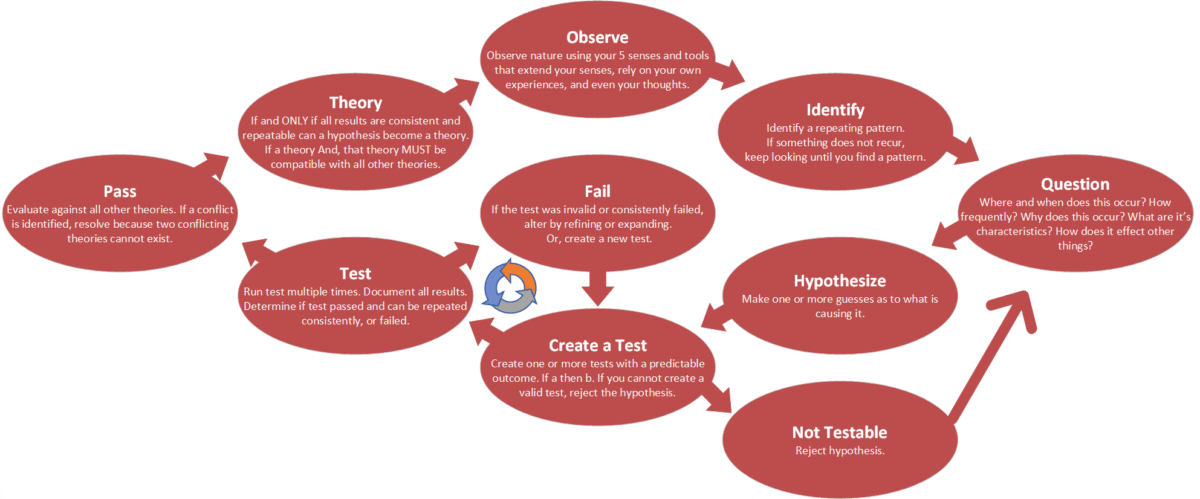About 10% of Americans believe vaccines cause autism. That’s about 33 million Americans. In a country where we believe so many easily proven wrong conspiracies and theories with no or little evidence, I wish more believed in and followed the scientific method. I guess I should not be surprised that so many believe the things they believe. After all, we Americans believe weird stuff!
- 80% believe in angels (182 million Americans)
- 60% believe in ghosts (200 million Americans)
- 24% believe in Astrology (80 million Americans)
- 15% believe in numerology (50 million Americans)
- 10% believe vaccines cause autism (33 million Americans)
- 7% believe the CIA killed Kennedy (23 million Americans)
- 6% believe the moon landing was faked (20 million Americans)
- 50,000 Americans follow Scientology
I’d like to stick up for the scientific method as the anti-vaxxer movement tends to propagate misleading and false propaganda. As always, I’m open to valid arguments using facts, but I think the hysteria around this subject does a disadvantage to science and to society.
First, agreement with a part of the anti-vaxxer movement. I agree that reviewing the CDC schedule and spreading out vaccines to reduce risk is a valid thing to do. This does not mean I agree that we should spread out vaccines more, but it does mean it is worth looking at and updating continuously as the science changes.

Weekly Wisdom Builder
Got 4 minutes a week?
A new 4-minute thought-provoking session lands here every Sunday at 3PM, emailed on Mondays, and shared throughout the week.
Exactly what the world needs RIGHT NOW!
The Anti-Vaxxer Movement
The following is a list of anti-vaxxer movement claims along with a short answer:
- Vaccines cause autism and/or brain damage.
- Answer: There is no link between vaccines and autism.
- Although the CDC claims the science is settled, here is a study they conveniently ignore.
- Answer: Science is not about finding an outlier study and proclaiming it the winner.
- Even the most rudimentary of studies shows far better childhood and adult health in nations who are NOT mandating mercury and aluminum poisoning of innocent children.
- Answer: Not true. Vaccines no longer have significant mercury nor aluminum in them. You get more of each every day from the food you eat.
- Vaccines are a money-driven, baby-killing agenda for the exclusive benefit of fascist psychopaths in big pharma and government.
- Answer: Science can drive scientists, but that’s true on both sides of any issue. Meaning, any scientist on Earth can make money by disproving bad science. That’s a good thing. As for baby killing, you’re wrong. Just look at any cemetery with headstones prior to vaccines.
- The USA has paid out billions through the National Vaccine Injury Compensation Program which completely indemnifies the drug companies from the many murders and disabling injuries they cause to innocent American children.
- Answer: Hyperbolic, but true. However, the statistically small risks from vaccines is much lower than the large risks of not vaccinating.
- Doctors are complicit and paid well for ensuring their patients get all their expensive poisons.
- Answer: Doctors recommend vaccinations every year because the viruses adapt and mutate so new vaccines are needed to build immunity against them.
- All vaccines ultimately weaken the human race.
- Answer: Kind of true, but vaccines simply improve your natural immune system’s ability to fight specific viruses. It is true that if you let viruses run wild, our natural ability as a herd to fight the virus would likely win, eventually, but that might take many centuries and way too many deaths.
Is the anti-vaxxer movement advocating for no vaccines? Or vaccines with no aluminum? Or, allow people to choose which one or none?
Is there mercury in today’s vaccines?
Regarding mercury in vaccines, the FDA removed most mercury from vaccines in 1999. The preservative thimerosal has trace amounts of mercury. The childhood vaccines that used to contain thimerosal as a preservative are now put into single-dose vials, so no preservative is needed. The only childhood vaccines today that have trace amounts of thimerosal are one DTaP and one DTaP-Hib combination vaccine. The extremely small amounts of mercury are left over from the manufacturing and well below other sources of mercury in your diet.

Weekly Wisdom Builder
Got 4 minutes a week?
A new 4-minute thought-provoking session lands here every Sunday at 3PM, emailed on Mondays, and shared throughout the week.
Exactly what the world needs RIGHT NOW!
Is there dangerous levels of aluminum in today’s vaccines?
There might be a yet found problem with vaccines, but it’s clear the problem is not with aluminum.
Even if there is a problem, I don’t think giving up on vaccines is an option either. Go to any cemetery and look at the headstones before 1950 and after 1960. You will see that prior to 1950 there were many baby headstones. After 1960 there are hardly any. That’s when people started vaccinating their kids. The advantage of vaccines is literally written in stone.
By the way, aluminum is found in numerous foods and beverages including fruits and vegetables, beer and wine, seasonings, flour, cereals, nuts, dairy products, baby formulas, and honey. Today and every day you will ingest 7 to 9 milligrams of aluminum per day which is down from about 24 mg/day in 1992. Even today, you will consume up to about 95 mg in a single day.
You wouldn’t, but if you got EVERY vaccine with aluminum in it in one day, you would add only 6.7 mg to today’s dose of aluminum.
- Pneumococcal vaccine = 0.125 mg/dose
- Diphtheria-tetanus-acellular pertussis (DTaP) vaccine < 0.625 mg/dose
- Haemophilus influenzae type b (Hib) vaccine = 0.225 mg/dose
- Hepatitis A vaccine (Hep A) = 0.25 mg/dose (pediatrics) 0.5 mg/dose (adults)
- Hepatitis B vaccine (Hep B) = 0.5 mg/dose (pediatrics), 0.5 mg/dose (adults)
- Hep A/Hep B vaccine = 0.45 mg/dose
- DTaP/inactivated polio/Hep B vaccine < 0.85 mg/dose
- DTaP/inactivated polio/Hib vaccine = 0.33 mg/dose
- Human Papillomavirus (HPV) vaccine = 0.5 mg/dose
- Japanese Encephalitis (JE) vaccine = 0.25 mg/dose
- Meningococcal B vaccine = 0.25 – 0.52 mg/dose
- Td vaccine < 0.53 – 1.5 mg/dose
- Tdap vaccine = 0.33 – 0.39 mg/dose
Is the CDC a Trusted Authority?
Should we believe the CDC? I currently consider the CDC to be a trusted source, a good authority, so I tend to believe statements like the following,
“The CDC says there is no link between vaccines and autism, therefore vaccines do not cause autism.”
Although I tend to believe statements from the CDC, the statement itself is not a valid argument. Even though they are a good authority using a scientific process, they still might be wrong. If someone says to me, “that’s an appeal to authority logical fallacy”, I have to agree with them because it is.
Although I personally tend to believe what the CDC says, I am open to any valid argument that links vaccines to autism, but, so far, I have seen no compelling evidence. My assumption is that the CDC uses a scientific process to come up with conclusions and that they are not swayed by unscientific pressures. Furthermore, I believe that anyone can prove them wrong with a single valid argument. Finally, I believe the CDC will correct themselves if proven wrong and evolve to a new truth once presented with a valid argument.
- Read More: The Appeal to Authority Logical Fallacy
Do vaccines weaken the human race?
Anti-vaxxers sometimes advocate for giving up on all vaccines and say:
“All vaccines ultimately weaken the human race.”
 That statement is kind of true, but it’s also a red herring logical fallacy, a distraction. Anyone can say that about all medicines and medical procedures. Every medical procedure weakens our gene pool or slows its progress to a stronger gene pool. Is anyone really advocating for no medical industry? Anytime you fix a broken bone that allows that person to grow up and reproduce, you’ve prevented an opportunity for those with stronger bones that did not break to reproduce. If you have a kid with a heart problem, do you have an operation and get him fixed? Or, do you let him die in order to improve the gene pool?
That statement is kind of true, but it’s also a red herring logical fallacy, a distraction. Anyone can say that about all medicines and medical procedures. Every medical procedure weakens our gene pool or slows its progress to a stronger gene pool. Is anyone really advocating for no medical industry? Anytime you fix a broken bone that allows that person to grow up and reproduce, you’ve prevented an opportunity for those with stronger bones that did not break to reproduce. If you have a kid with a heart problem, do you have an operation and get him fixed? Or, do you let him die in order to improve the gene pool?
Vaccines simply improve your natural immune system’s ability to fight specific viruses. That’s true whether you are infected by the virus or get a vaccine. Sometimes the virus increases your immune system better and longer, and sometimes an infection does, but both usually increase your immunity. It is true that if you let viruses run wild, our natural ability to fight the virus as a herd would eventually win but that might take many centuries and many deaths and there is a chance of a virus mutation leading to the extinction of humanity. A virus like ebola that that mutated in a way to make it just twice as deadly and twice as infectious would likely wipe out humanity if left to run wild.
I found a study that says vaccines may cause a problem!
Remember, science is not about finding an outlier study and proclaiming it the winner and it is disingenuous to take an outlier study and conflate it in support of a cause using drive-by propaganda techniques. If that study actually deserves to win, other studies will back it up. Until then, let’s go with the best studies available.
Herd Immunity is not Perfect…
…but don’t throw the imperfect out in pursuit of the perfect.
No one is saying herd immunity is perfect, just that it’s an important factor that should not be ignored if you are otherwise healthy. Meaning, consider getting vaccinated so you don’t kill someone else who just could not.
1. Old folks are sometimes asked to get two shots “just in case” because the flu vaccine is only about 60% effective in helping your body build up a lifelong immunity to a specific strain. It has nothing to do with lasting 6 months. Getting it twice just gives you two shots at the 60% success rate.
2. It is true that for most people their immune system weakens as they get older. Doctors frequently recommend older people get a second booster shot in order to stimulate their immune system more and give them a better shot at immunity to specific viruses.
3. Doctors recommend vaccinations every year because the flu virus is in a constant state of adaptation and mutation rendering older vaccines obsolete for the current strain even some do indeed last for your lifetime and will help protect you against related strains and even generally increase your immune system.
4. Immunity to a specific strain is usually lifelong and it frequently helps with related strains.
And yes, there are strains like smallpox that you can get multiple times, but usually our immune system kicks ass…for a lifetime! Meaning, if you get a flu shot every year, you will avoid many dozens of flu strains for life. The problem is that the flu constantly evolves so it “feels” like it’s not for life because you may only encounter a particular strain once in your life either from a vaccine or the live version.
5. Researchers from the CDC, FDA, WHO, and NIH analyze global data on circulating influenza strains in humans and animal populations. Scientists map disease trends and identify the three or four strains most likely to hit during the upcoming flu season. This is a continuous and constant process.
How Flu Shots Work
1. Regarding yearly flu shots. Essentially, the experts pick 2 to 5 strains of flu they “think” will make the rounds “next year”. If they’re wrong, the flu shots were still not a waste because of the immunity for later years.
2. It’s true that when you build immunity to many influenza strains, it can last for life. Meaning, if you get a flu shot every year, you add to your immunity and over many years, you will be more resistant to more influenza strains when compared to someone who did not, or could not, get the shots.
3. My understanding is that we don’t know if humans can build a lasting immunity to Covid-19 yet. Once a vaccine is available, it may last a few years or for life. Most believe it will likely be for life.
4. Herd immunity will kick in either way. Meaning, if we get the vaccine or 30% to 60% get infected over the next few years, those folks will protect those that cannot get the vaccine because of age or health reasons.
Should I vaccinate Yearly?
Vaccines Get Weaker Over Time
Your body’s immunity to the flu decreases over time. This is true whether you’ve had a vaccination or a flu infection.
Your body’s immunity to [all future strains of] the flu decreases over time [mainly because the flu strain itself is constantly evolving, but also because your immune system may decline generally as you age]. This is true whether you’ve had a vaccination or a flu infection. [Meaning, you have the antibodies in your system from a successful vaccine shot or flu infection, but both are specific to a strain of the flu even though they also help generally, but with age comes a weaker immune system.]
The Scientific Method
The scientific method is a process driven by many things including the desire to fix something, knowledge, fame, and/or money. There are many scientists in the world trying to make a name for themselves. If there is a problem with our vaccines, our scientists will find it.
In science, you put forth a theory. Construct experiments to prove or disprove it. You publish your findings. Other scientists try to prove you wrong so they can make a name. If they agree, they support you and get “a little” glory but not as much as if they struck you down. Also, they try to add to the theory if they can. If a scientist gets it wrong, the theory is dropped.
One of the best facts in support of the scientific method is the fact that…
The scientific process is nearly exactly the same in every country, all over Earth.

Understanding and following the scientific method can help one get closer to the truth. Science represents the best estimate of truth based on current evidence. Although science is a quest for truth, it does not represent truth itself. It is a tool at our ready for analyzing the physical world. The conclusions of science represent the best estimate of our physical world and is based on current evidence. In a confusing world, science represents the truth, at least until a fact is proven wrong or an argument is invalidated.















